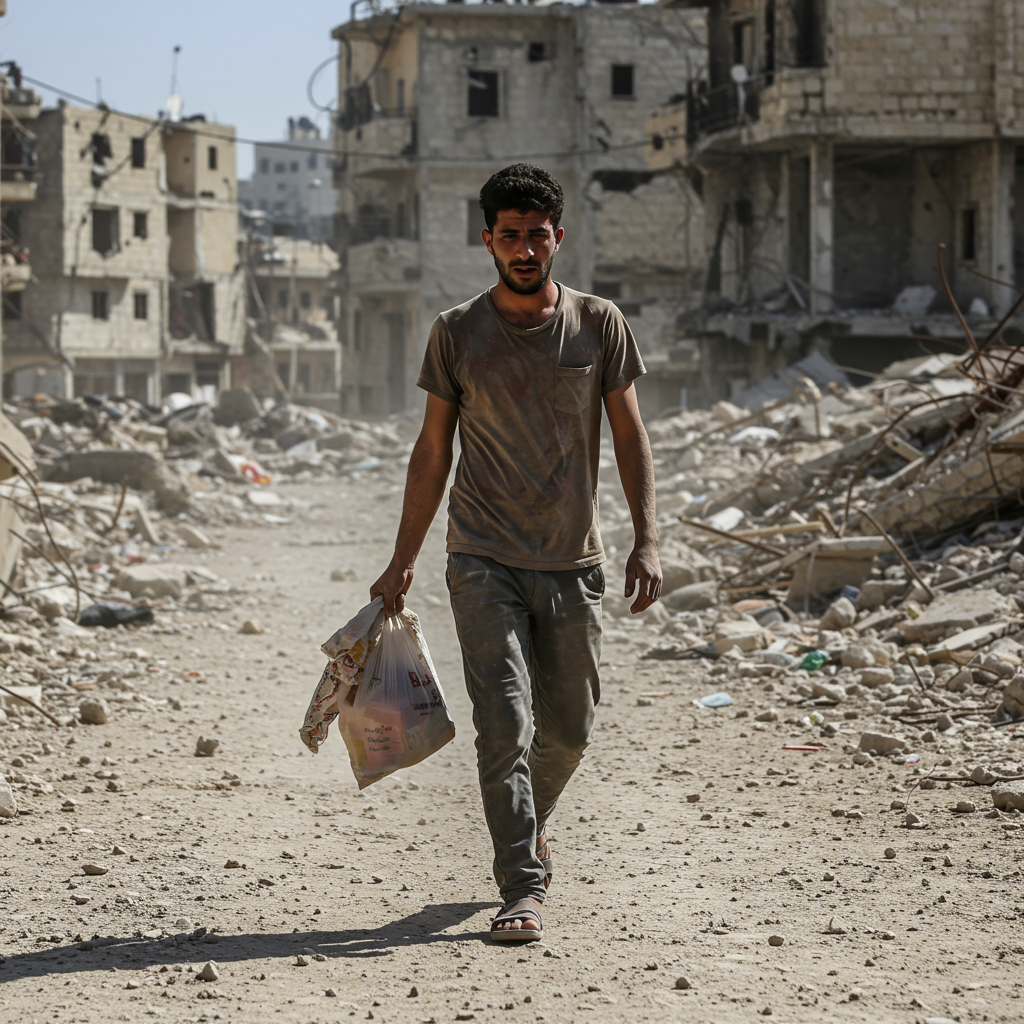The Deadly Struggle for Food in Gaza: A Mother’s Tragic End
In the heart of Gaza’s deepening humanitarian crisis, the simple act of seeking food has become a perilous journey often marked by danger and death. Reem Zeidan, a 42-year-old Palestinian mother of eight, epitomizes this tragic reality. Driven by the hunger of her children, she embarked on a desperate overnight trek through a conflict zone, only to be killed before she could reach the aid she so desperately needed.
Reem, with two of her children, Mervat, 20, and Ahmad, 12, set off from their makeshift shelter in Khan Younis just after sunset. Their destination: a distant aid distribution site near Rafah. The goal was a bag of flour to bake bread and perhaps some biscuits for her five-year-old daughter, Razan, who longed for them. The journey was long and arduous, stretching for hours through the darkness, a stark reflection of the immense distances Palestinians must now travel for a chance at sustenance.
Reem knew the risks. She had attempted the treacherous trip before, sometimes arriving too late or turning back due to gunfire near distribution points. This time, carrying a blue backpack hopeful of supplies, she walked through the night, arriving at a seaside area north of Rafah known as “Fish Fresh” around 5 am, hours before the aid site was scheduled to open. Thousands of other displaced Palestinians had gathered here, waiting in the pre-dawn hours for access.
The Perilous Landscape of Aid Distribution
Reem’s death highlights the fatal flaws in the current aid distribution system in Gaza. Following the sidelining of the UN’s extensive aid network by Israel, a new system led by the US- and Israel-backed Gaza Humanitarian Foundation (GHF) was established, operating from just a handful of sites. Humanitarian organizations, including the UN Human Rights Office, warned that this limited access would be chaotic, insufficient, and dangerously expose civilians seeking help.
These warnings have proved tragically accurate. According to reports from local health authorities, witnesses, and Gaza Civil Defense figures compiled by various news outlets, hundreds of Palestinians have been killed and thousands injured since the new system began in late May while attempting to reach or wait near aid distribution points. This perilous search for food has been described by some as akin to a deadly “Hunger Games.” Incidents involving scores of casualties have been reported, including a particularly deadly event in Khan Younis in mid-June.
Areas surrounding the GHF sites, outside of designated opening hours, are often considered closed military zones by the Israel Defense Forces (IDF). Despite warnings from GHF for people to stay away before distribution begins – a directive that is nearly impossible for those traveling long distances – desperate crowds gather, facing constant threats.
Caught in the Crossfire
As Reem, Mervat, and Ahmad rested at Fish Fresh, they came under intense fire. Ahmad recounted hearing snipers, artillery, tanks, and drones. “There was nothing left untouched,” he told NBC News, “not even the sea.” While independent verification of these accounts can be difficult, the IDF acknowledged an incident in the area that day, stating forces fired “near” individuals moving towards them and deviating from “designated access routes” to aid sites.
Later, as the family continued walking in a crowd around 4 a.m., about half a mile from the distribution point, crouching low in the darkness, Mervat heard a scream. She turned to see her mother fall, her face covered in blood from a shot to the head. In shock, Mervat desperately tried to wake her mother amidst renewed gunfire, but the surging, panicked crowd forced her and Ahmad to flee for safety, leaving Reem behind.
Reem Zeidan was one of nearly 30 people the Palestinian health ministry alleged were killed that day under similar circumstances near the GHF site. The IDF stated they fired warning shots at “suspects” who failed to retreat, then fired “near a few individual suspects,” adding they were investigating the incident but later offered no further comment. GHF also acknowledged the incident, stating it occurred in a “closed military zone” well “beyond our secure distribution site.”
More Than Hunger: Forced Displacement and Aid Obstruction
Reem’s story is intrinsically linked to the broader context of mass displacement and severe aid restrictions in Gaza. Human Rights Watch and other rights groups argue that Israel’s actions since October 2023 amount to widespread forced displacement, a potential war crime and crime against humanity. With 1.9 million Palestinians displaced from their homes, survival depends entirely on humanitarian aid, yet access is severely obstructed.
Critics contend that the current aid mechanisms, including the GHF system, are insufficient and fail to ensure safe, dignified distribution. Reports describe chaotic scenes at distribution points, with people fighting over limited supplies, sometimes under the watch of armed personnel. The Red Cross and other groups have reported hundreds of casualties brought to medical facilities from these incidents. The amount of aid reaching Gaza is a “tiny fraction” of what is needed for the starving population of 2.1 million, exacerbating the desperation that drives people to risk their lives.
The ongoing destruction of civilian infrastructure and the creation of buffer zones also raise concerns that displaced Palestinians may be prevented from ever returning home, adding another layer of suffering to the humanitarian catastrophe.
A Family’s Grief, A Crisis Laid Bare
Reem’s children did not see her again until her body arrived at Nasser Hospital in Khan Younis. Her husband, Mohammed Zeidan, mournfully remembered his wife as “God’s paradise… my soul,” declaring the new aid system “a trap, not aid.”
Ahmad, holding his mother’s blood-stained blue backpack – the one intended for carrying food – captured the raw grief and the cruel irony of her death. “They killed you, Mom,” he wailed, “just because you were trying to get us food.” The backpack, a symbol of hope for sustenance, became a stark reminder of the deadly cost of hunger in Gaza. For the surviving children, already having lost an elder brother in a previous bombing, Reem’s death adds immeasurable trauma and loss, forcing them to confront a future marred by grief and continued hardship in a besieged territory.
Humanitarian organizations continue to demand that Israel cease firing on civilians seeking food and allow substantially more aid into Gaza through safe, organized channels, warning that the current conditions are unacceptable and continue to claim innocent lives.




